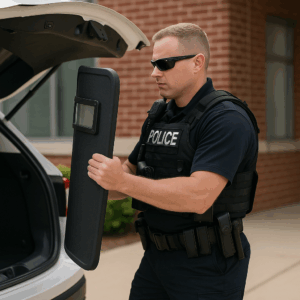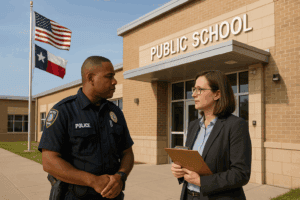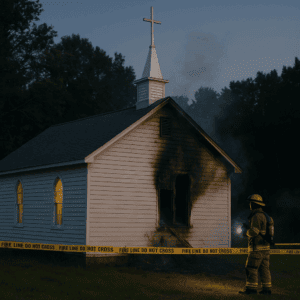School safety and security committees are an essential component of creating and maintaining a safe and secure school environment for staff and students.
These committees are guided by the Texas Education Code 37.109, which mandates that each school district or open-enrollment charter school establish a safety and security committee based on Texas School Safety Center guidelines.
The purpose of these committees is to provide central coordination of safety efforts and assist with drills and exercises, school safety and security audits, policy development, and training.
To ensure the committee has a significant impact on the school’s climate and culture, representation from various perspectives on school safety and security is necessary.
According to the guidelines, the committee must consist of at least seven individuals, including representatives from the city or county’s office of emergency management, the local police department or sheriff’s office, the board of trustees, the district, parents or guardians of currently enrolled students, and, if applicable, a member of the charter school’s governing body or their designee.
The committee has several mandated responsibilities, including participating in the development and implementation of the district’s emergency plans, providing recommendations to the district’s board of trustees and district administration, and periodically reviewing and updating the district’s multihazard emergency operations plan (EOP).
Overall, school safety and security committees play a crucial role in ensuring the safety and security of staff and students in schools.
By following the guidelines outlined in the Texas Education Code 37.109, these committees can effectively coordinate safety efforts, assist with drills and exercises, and develop policies and procedures to create a safe and secure school environment.
Purpose of School Safety and Security Committees
School Safety and Security Committees are working groups of diverse individuals that serve their school district or open-enrollment charter school by helping to create and maintain a safe and secure school climate and culture for staff and students.
The committees are mandated by Texas Education Code 37.109 and operate in accordance with guidelines from the Texas School Safety Center (TxSSC).
The purpose of the committee is to provide central coordination of safety efforts and to assist with drills and exercises, school safety and security audits, policy development, and training.
The committee consists of representatives from various perspectives on school safety and security to have a significant impact on the school’s climate and culture.
The committee must consist of at least the following individuals whose names are recorded in the district’s multi-hazard emergency operations plan (EOP) [TEC 37.108(f)(8) and TEC 37.109(a-1)].
The committee must include representation from the city or county’s office of emergency management, the local police department or sheriff’s office, the board of trustees, the district, parents or guardians of currently enrolled students, and any instructional partnership with an open-enrollment charter school.
The committee operates in accordance with guidelines from the Texas School Safety Center (TxSSC).
By law, the committee must hold meetings at least three times per year and must periodically provide updates to the school board. Schools should be required to notify parents if a significant threat to students’ safety occurs.
The committee must participate in the development and implementation of the district’s emergency plans by ensuring they are consistent with the district’s EOP and reflect the specific campus, and facility.
They must also develop and implement policies related to school safety and security, including policies related to the use of security cameras, visitor management systems, and emergency response procedures.
In summary, School Safety and Security Committees play a crucial role in ensuring the safety and security of students and staff in schools.
Their diverse membership and mandate to coordinate safety efforts make them a valuable asset to any school district or open-enrollment charter school.
Membership Guidelines
The School Safety and Security Committee is a working group of diverse individuals that serves the members of its school district or open-enrollment charter school by helping create and maintain a safe and secure school climate and culture for staff and students.
For this committee to have a significant impact on the school’s climate and culture, there is a need for representation from various perspectives on school safety and security.
Representation from Emergency Management
At least one representative from the city or county’s office of emergency management must be part of the committee.
This ensures that the committee has access to the latest information on emergency management and can coordinate with local emergency responders.
Local Law Enforcement Representation
At least one representative from the local police department or sheriff’s office must be part of the committee.
This ensures that the committee has access to law enforcement expertise and can coordinate with local law enforcement agencies.
Board of Trustees Representation
The committee must consist of the president and at least one other representative of the board of trustees.
This ensures that the board of trustees is aware of the committee’s activities and can provide support as needed.
District Representation
The committee must consist of the superintendent and at least another designee, one being a district classroom teacher.
This ensures that the committee has access to expertise on district operations and classroom safety.
Parental Representation
At least two parents or guardians of currently enrolled students must be part of the committee.
This ensures that the committee has access to the perspectives of parents and guardians and can address their concerns.
Open-Enrollment Charter School Partnership
If the district has an instructional partnership with an open-enrollment charter school, a member of the charter school’s governing body, or their designee, must be part of the committee.
This ensures that the committee can coordinate with charter schools and address their unique needs.
District Police Department
If the district has its own police department, at least one representative from the department must be part of the committee.
This ensures that the committee has access to law enforcement expertise within the district.
According to Texas Education Code 37.109, the committee has the following mandated responsibilities to fulfill their purpose: Participate in the development and implementation of the district’s emergency plans by ensuring they are consistent with the district’s EOP and reflect the specific campus, and facility.
Overall, the School Safety and Security Committee is a critical component of a school district’s safety and security plan.
By including representatives from various entities, the committee can provide a comprehensive approach to school safety and security.
Responsibilities of the School Safety and Security Committee

The School Safety and Security Committee is a working group of diverse individuals that serves the members of its school district or open-enrollment charter school by helping create and maintain a safe and secure school climate and culture for staff and students.
The committee has the following mandated responsibilities to fulfill its purpose:
Development and Implementation of Emergency Plans
The committee is responsible for participating in the development and implementation of the district’s emergency plans by ensuring they are consistent with the district’s Emergency Operations Plan (EOP) and reflect the specific campus, facility, and community needs.
They must also ensure that the emergency plans are reviewed and updated annually to reflect changes in the district’s needs, personnel, or facilities.
Safety and Security Audit
The committee is also responsible for conducting safety and security audits of the district’s facilities, grounds, and operations.
The audit should identify potential safety and security hazards and recommend corrective actions to mitigate or eliminate the identified hazards.
Training
The committee is responsible for ensuring that all district staff members receive training on emergency procedures, including evacuation, sheltering, and lockdown procedures.
The committee should also provide training to staff on recognizing and reporting potential safety and security hazards.
Drills and Exercises
The committee is responsible for coordinating and conducting drills and exercises to test the district’s emergency plans.
The drills and exercises should include scenarios that reflect the specific hazards and threats that are present in the district.
Audits
The committee should also conduct periodic audits of the district’s compliance with Texas Education Code 37.109 and the guidelines established by the Texas School Safety Center (TxSSC).
The audit should identify areas where the district is not in compliance and recommend corrective actions to bring the district into compliance.
Roles and Responsibilities
The committee is responsible for defining the roles and responsibilities of district staff members during an emergency.
The committee should also identify the resources that are available to support the district’s emergency response efforts.
In summary, the School Safety and Security Committee has a critical role in ensuring the safety and security of staff and students in the district.
By fulfilling their mandated responsibilities, the committee can help create and maintain a safe and secure school climate and culture for everyone.
For more information, please refer to the guidelines established by the Texas School Safety Center (TxSSC) and the TASB Legal Services article on School Safety and Security Committees.
Conclusion
The School Safety and Security Committee plays a critical role in creating and maintaining a safe and secure school climate and culture for staff and students.
By bringing together diverse individuals from various perspectives on school safety and security, the committee can ensure that emergency plans are consistent with the district’s EOP and reflect the specific campus, facility, or program.
The committee’s mandated responsibilities include participating in the review and update of the district’s emergency plans, conducting a school safety and security audit, providing a report to the district’s board of trustees, and providing training to district employees on school safety and security.
With the School Safety and Security Committee’s guidance and support, school districts and open-enrollment charter schools can create safe and secure learning environments for their students and staff.








